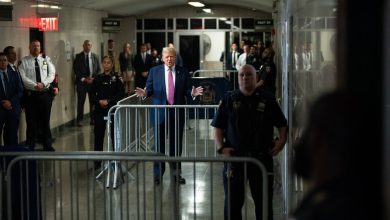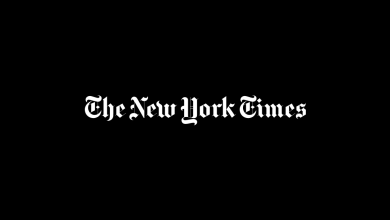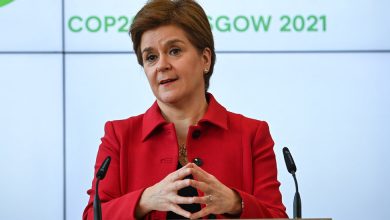‘A Very Significant Moment for Business’

Seeing green
The S.E.C. voted yesterday on sweeping rule changes that would require public companies to disclose climate-related risks and greenhouse gas emissions. Though many already report some of this information, no mandatory standard exists, making it hard for investors to compare data across companies.
“There’s an efficiency that comes from standardization,” the S.E.C. chair Gary Gensler told reporters after the vote.
A new rule could take a while. The S.E.C. is taking public comment on the proposals for 60 days, and Gensler was reluctant to provide a time frame for final adoption of a rule. “We’ll take the time it takes to get it right,” he said. Gensler expects lots of input, judging from the flood of responses last year, when the idea of mandatory disclosure was first floated. The agency may have to adjust its proposal as a result. (You can read all 500-odd pages of the proposal here.)
Gensler rejected criticism that the S.E.C. is overreaching,and would not get into a discussion of potential legal challenges. “It’s a disclosure regime within a long tradition of disclosure regimes,” he said, noting that the agency was responding to investor demand for more information on climate risks. But Hester Peirce, a Republican commissioner at the agency, explained her vote against the proposal by saying that it “turns the disclosure regime on its head,” telling “managers how regulators, doing the bidding of an array of non-investor stakeholders, expect them to run their companies.” Lawmakers also waded in:
-
Representative Patrick McHenry of North Carolina, the top Republican on the House financial services committee, said he rejected the effort to require information “that is not material for most companies.”
-
But Senator Sheldon Whitehouse, Democrat of Rhode Island, said the S.E.C. didn’t go far enough, because the proposal omits disclosures on “climate-related lobbying and influencing activities,” which he called “the single most material disclosures a company could make to achieve climate safety.”
“This is a very significant moment for business and stakeholders,” the former S.E.C. chief accountant Wes Bricker, now of PwC, told DealBook. Many companies have been reporting climate-related information voluntarily, he said, but without a consistent set of mandatory disclosures, there are concerns about greenwashing and the completeness of information. “This raises the bar for all companies,” Bricker said.
HERE’S WHAT’S HAPPENING
Judge Ketanji Brown Jackson pledges to be independent. On the first day of her confirmation hearings in the Senate, President Biden’s Supreme Court candidate said she wouldn’t be beholden to ideology. Republicans attacked her record as a public defender.
Lenders seize over $2 billion in Evergrande assets. Banks enforced their rights over money held at a subsidiary of the troubled Chinese real estate developer, after an internal review raised red flags. Evergrande said it would delay the release of its annual financial results because of ongoing audit work.
Nickel trading resumes as the market begins to stabilize. Trading on the London Metal Exchange remained within the limits set by the market after high volatility led to shutdowns and false starts in recent weeks. Prices continue to drop, which suggests the short squeeze that shut down trading is abating.
U.S. Covid vaccination rates have stalled. About a quarter of eligible adults remain unvaccinated, and half haven’t gotten a booster shot, as the loosening of pandemic restrictions eases demand for the vaccines.
The W.T.O.’s chief calls for “reglobalization” to ease supply-chain crunches. Ngozi Okonjo-Iweala, the organization’s director general, said that bringing more countries into international production networks could address shortages that have driven up prices.
The latest in the Russia-Ukraine war
-
President Biden warned companies to prepare for cyberattacks by Russia in retaliation for sanctions.
-
Here’s how the Russian oligarch Roman Abramovich invested in U.S. hedge funds for years while obscuring the source of the money. Meanwhile, the steelmaker Evraz, in which he owns a 28 percent stake, said it was blocked from making a bond payment because of British sanctions on him.
-
Agricultural giants like Cargill have refused to cut ties with Russia, citing humanitarian concerns. Nestlé defended its continued presence in Russia by saying it wouldn’t profit from operations there.
-
Here’s the harrowing story of how the last international journalists in Mariupol fled the city.
-
For up-to-the-minute news, see The Times’s live blog and updated maps.
An unusual coalition assembles against the S.E.C.
When Archegos Capital Management, a little-known investment firm, blew up last year because of bad bets, it roiled stocks and cost banks billions. The firm had used swaps, a type of derivative, to hide its enormous positions, and the S.E.C. responded by proposing new rules to prevent something similar from happening again. An unusual coalition of labor activists, professors, corporate law firms and hedge funds are pushing back against the proposal, The Times’s Maureen Farrell reports.
What’s the proposed rule? Swaps are one of the ways hedge funds and other large investors build up positions in companies without making others aware of their interest. Under the S.E.C.’s new rule, investors who use swaps to build large positions in companies would have to disclose those trades within a day of making them. (Large investors who buy stock directly have 10 days to disclose their positions.)
Why are people opposed to it? Activist hedge funds that use swaps say earlier disclosure would allow companies to use methods to block them from buying shares. Alerting the market to their transactions would drive up the price of a company’s stock, making it more expensive to buy a big enough stake to have influence on a company’s strategy. Labor advocates say the swaps rule would make it harder for unions to use pension fund investment to push for changes as well. The S.E.C. has received more than 1,200 comment letters about the proposed rules, a sign of the depth of feeling about the issue.
The difference a year makes
The Federal Reserve has a dual mandate: It must foster maximum job growth, but also keep inflation low by not letting the economy run too hot. It’s a tricky balance.
A little over a year ago, Fed chair Jay Powell seemed willing to let inflation rise for the sake of the labor market, noting that low- and middle-income workers benefit most from long expansions. Powell noted that a majority of Fed officials expected no interest rate increases for years.
“We will not tighten monetary policy solely in response to a strong labor market,” Powell said in February last year.
Fast forward to today, with inflation running stubbornly high and a surplus of job openings. Now, Powell says the Fed will consider erring on the side of raising rates higher and faster than expected to tame inflation.
“There is an obvious need to move expeditiously to return the stance of monetary policy to a more neutral level,” Powell said yesterday, suggesting that raising rates to “more restrictive levels” might be necessary if inflation doesn’t come down.
Bond yields rose sharply on Powell’s comments, reflecting worries about the Fed’s ability to engineer a so-called soft landing, in which inflation is brought under control without a spike in unemployment. Indeed, Powell acknowledged the challenge.
“No one expects that bringing about a soft landing will be straightforward,” he said.
Boeing’s latest crisis
Rescuers are combing the hillsides in a remote part of southern China, looking for any survivors of yesterday’s crash of a plane operated by China Eastern Airlines, with more than 130 people on board. The Boeing 737-800 NG rapidly lost altitude about an hour into the flight, and it could be weeks or even months before investigators identify what caused the crash.
It is the latest upheaval for Boeing and another test for its chief executive, David Calhoun, who built a brand as a leadership and crisis management guru before becoming C.E.O. of the airplane maker in early 2020, after more than a decade as a director on its board.
The crash is another setback for Boeing, which has faced trouble with two of its flagship models: the single-aisle 737 Max and the twin-aisle 787 Dreamliner. The 737 Max was grounded worldwide for more than a year after two deadly crashes, in late 2018 and early 2019. It replaced the 737-800 NG, a workhorse of the skies that accounts for nearly a fifth of passenger planes in service worldwide. Production delays for the Dreamliner were a factor in Boeing’s $4.2 billion loss last quarter.
It could be a blow to Boeing’s business in China, where the company has struggled recently. While the Max was cleared to fly again in the U.S. and most other countries, China granted approval only in early December, and its return to the skies there could be delayed by yesterday’s crash. Boeing delivered about a dozen planes to Chinese buyers last year, while Airbus, Boeing’s main rival, delivered more than 140.
Calhoun, a former top G.E. executive, has a reputation for crisis management, steering a number of companies through tough times. He took over as C.E.O. of Boeing after the Max crashes, and has guided the company through the pandemic, which hit the company’s finances hard. Boeing’s stock has also lagged that of Airbus during Calhoun’s tenure, but he has gotten positive reviews. Last year, the company raised its mandatory retirement age from 65 to 70, so that the then-64-year-old Calhoun could continue as chief.
“Dave Calhoun has continually been drafted for his leadership roles based on his competence and character,” the Yale management professor Jeffrey Sonnenfeld told DealBook.
THE SPEED READ
Deals
-
Alibaba’s beleaguered share price jumped after it announced plans to buy back shares worth $25 billion. (CNBC)
-
Switch, a data center operator with a $7 billion market value, has hired advisers and is reportedly considering a sale. (Bloomberg)
-
The shortlist of bidders vying to buy the soccer club Chelsea F.C. after its Russian owner was hit with British sanctions will reportedly be cut to three. (Reuters)
-
A Saudi pharmacy chain’s blockbuster I.P.O. highlighted how listings in the oil-rich country are defying gloom in other markets. (Bloomberg)
Policy
-
The D.C. attorney general sued Grubhub, accusing the food-delivery service of hidden fees and deceptive marketing practices. (Protocol)
-
Five takeaways from the latest campaign donation disclosures. (Politico)
-
A Black homeowner is suing Wells Fargo in federal court, alleging that the bank’s lending algorithms draw on racist history to deny refinancings for Black borrowers. (NYT)
Best of the rest
-
Places in Singapore private schools are scarce as families flock from Hong Kong to avoid pandemic restrictions. (FT)
-
“Bitcoin Miners Want to Recast Themselves as Eco-Friendly” (NYT)
-
Do global teams see diversity and inclusion as a uniquely American problem? (HBR)
-
Why the second-largest cryptocurrency destroyed $6 billion of its supply on purpose. (Fortune)
-
“I Think I Just Solved Daylight Saving Time” (Times Opinion)
We’d like your feedback. Please email thoughts and suggestions to [email protected].



